秦始皇英文介绍
- 格式:doc
- 大小:19.00 KB
- 文档页数:2
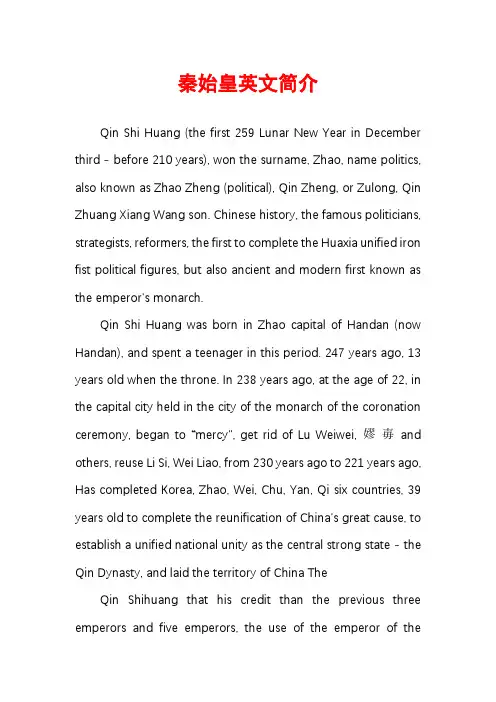
秦始皇英文简介Qin Shi Huang (the first 259 Lunar New Year in December third - before 210 years), won the surname, Zhao, name politics, also known as Zhao Zheng (political), Qin Zheng, or Zulong, Qin Zhuang Xiang Wang son. Chinese history, the famous politicians, strategists, reformers, the first to complete the Huaxia unified iron fist political figures, but also ancient and modern first known as the emperor's monarch.Qin Shi Huang was born in Zhao capital of Handan (now Handan), and spent a teenager in this period. 247 years ago, 13 years old when the throne. In 238 years ago, at the age of 22, in the capital city held in the city of the monarch of the coronation ceremony, began to “mercy", get rid of Lu Weiwei, 嫪毐and others, reuse Li Si, Wei Liao, from 230 years ago to 221 years ago, Has completed Korea, Zhao, Wei, Chu, Yan, Qi six countries, 39 years old to complete the reunification of China's great cause, to establish a unified national unity as the central strong state - the Qin Dynasty, and laid the territory of China TheQin Shihuang that his credit than the previous three emperors and five emperors, the use of the emperor of the"emperor", the emperor of the "emperor" constitute the "emperor" title, is the first in Chinese history to use the "emperor" title of the monarch, so self- " At the same time in the central implementation of the three public Jiuqing, the management of national affairs. Local abolition of sub-seal system, on behalf of the county system, at the same time the same book, car with the track, a unified measure. External north of the Huns, South levy Baiyue, built the Great Wall, the construction of Lingqu, communication water system.But in the late, beggar dream of longevity, harsh abuse of people, shook the foundation of the Qin Dynasty rule, the first 210 years, Qin Shihuang East tour on the way to collapse in Xingtai dunes.Qin Shihuang is an all-powerful and epoch-making figure in Chinese history. It is the first emperor of the Chinese dynasty, the founding emperor of the Qin dynasty, which has had a profound impact on China and world history and pushed China into a great reunification era, Laying the basic pattern of China's political system more than two thousand years, by the Ming Dynasty thinker Li Zhi known as "through the ages."Early experienceQin Shihuang in the forty-eight years of the first month (January 27, 259 BC) was born, the birthplace of the city of Handan City (Great North City) Wen Ming Dian site and Cong Taiwan to the south, in this city in the east of the street Taiwan southwest of Zhujia Lane area. Is the Qin Zhuang Xiang Wang's neutron, Shang dynasty minister to evil to the 35th Sun, won the surname Zhao, name politics.247 years ago, Qin Zhuang Xiang Wang collapse, 13-year-old Ying Zheng was established as the king, then Lv Buwei for the phase, independent power. Ascended the throne because of the young, the country is dominated by the state Lv Buwei control, and respect for Lu Zhongwei for the father. In 239 years ago, Qin Wang Zheng was 21 years old will be pro-government, but this time the Qin court has set off a fierce political struggle.Early Lv Buwei not only hold the court, but also with the Queen Mother (Zhao Ji) betrayal. After the Qin Wang Zheng increasingly old, afraid he was found, want to leave the Queen Mother, afraid of the Queen Mother resentment, so put their own door off the fake corruption, only remove the beard, eyebrows dedicated to the Queen Mother, for its music The Qin Wang Zheng grew up, so they lie to him that the Queen Mother Palacefeng shui bad, should be removed from here. Qin Wang Zhengxin that is true, so they moved to Yongxian palace, the results of the Queen Mother gave birth to two bastard, and the 嫪毐also to Qin Wang Gong fake father, 嫪毐in a drunk after a minister reprimanded: "I am the king The father of the dare father, you dare to provoke me. "This minister was very angry to hear, and secretly find a chance to the relationship between the Queen and the Queen Mother told Qin Wang Zheng, Qin Wang Zheng learned very angry, The And 嫪毐in the Queen Mother's help was sealed as long letter Hou, with Shanyang, Taiyuan and other places, since the party.嫪毐operating in the Yong City for many years, the establishment of a huge force, is the Qin Dynasty after Lu Weiwei a strong political forces.In 238 years ago, Qin Wang Zheng in the city of Yong City Corps held crown ceremony.嫪毐use Qin Wang Yu Xi and the Queen Wu Xi launched a rebellion, attack the Qiyun Palace. Qin Wang Zheng has been arranged in the Qiyun Palace three thousand elite, defeated the rebels.嫪毐turn Xianyang Palace, where the army has long ago, 嫪毐one person fled, not long before they were arrested. Qin Wang Zheng will be cleansing, exposed dead show the public; again the mother Zhao Ji GuanYu Yong City of the palace; wrestling with the Queen Mother born two bastard. The following year, Wang Wang Wang Lv Buwei from the phase of the job, the Lv Buwei exile to Bashu. Lv Buwei know that his relationship with the king can not be saved, drinking poison suicide. Later, although the Qin Wang Zheng heard the aristocracy of Qin said, under the "guest book", expelled from the six diners, but was Li's "remonstrance by the guest book" discouraged, then he reused the Wei Liao, Li Si And so on.Unified six countriesQin Wangcheng in power, the appointment of Wei Liao and Lisi and others, and actively implement a unified strategy.In 236 years ago, Zhao, Yan two countries war. Zhao Gong sent troops to attack Yan, and Qin to save the name of Wang Jian Jian will be sent troops to attack Zhao, respectively, took Zhao's 阏and, 轑Yang (Nanyang northwest), Hejian (Hebei Xianxian southeast), Anyang (Hebei Yangyuan County southeast) and other cities, Zhang water basin has been occupied by the Qin.In the first 234 years, Qin and Zhao to attack Zhao, to take the Zhao established Yanmen County and the cloud in the county.231 years ago, Wei was forced to part of the land Qin Qin, South Korea was also forced to offer the Nanyang Qin.Qin sent within the history of Teng to do Nanyang fake.In the past 230 years Qin sent within the history of Teng attack Korea, captured the Han Wangan, built in the Han Dynasty Yingchuan County, South Korea perish. At this time Zhao suffered a major drought. Qin Wang Jian led the army directly under the Jingxing (Jingxing County, Hebei Province), Qin will be led by the end of Hanoi soldiers into the Zhao are Handan. Zhao sent Li Mu, Sima Shang led the army to resist. Zhao Wang pet minister Guo Kai by the Qin bribe, spread rumors that Li Mu, Sima Shangguo against. Zhao Wang therefore switch to Zhao Cong and Yan together for Li Mu, Sima Shang, and killed Li Mu.In the first 229 Wang Jian broken Zhao Jun, killed Zhao Cong, captured the king of Zhao. Zhao Gongzi Jia led his family hundreds of people fled to Zhao on behalf of the county, self-reliance on behalf of the king. Qin in Handan area in Handan established Handan County.In the first 227 years, Qin sent Wang Jian, Xin Sheng attack Yan. Yan, on behalf of the two countries sent troops to resist, was defeated in the west of Yi water. The following year the Qin army attack Yan are thistle city. Yan Wang Xi moved to Liaodong. Qin will be loyal to the pursuit of the letter, Yan Wang Xi listen to theplan on behalf of Wang Jia, killing Prince Dan, Prince Edward Dan's head dedicated to Qin and sum.226 years ago, South Korea capital rebellion, Qin sent troops to settle the Korean rebellion, took the opportunity to sacrifice Han Wang.In the past 225 years, Qin Wang political party general Wang Biao attack Wei, surrounded by Wei are beam (Kaifeng City), cited the Yellow River water city, three months Liang City bad, Wei Wang out, Wei destroyed. Qin in the eastern part of Wei established Dang County. In the same year, Qin sent Li Xin, Meng Wu with 20 million troops attack Chu. Li Xin attack Chu Pingyu (Pingyu County North), Meng Wu attack Chu sleep (Anhui Linquan County), made the initial victory. Qin and the two armies in the city father (now Anhui Province Bo County southeast city father) meet, Chu by Qin Jun not prepared to launch a counterattack, defeated Qin. Wang Jian Wang Qin Wang Jian army with 600,000 troops set off, breaking the Chu army in Qi (now Anhui Suxian southeast), forcing Chu to commit suicide. Then the Qin army captured Chu Shouchun, captured the king of negative brilliance. Qin Yu Chu Jiujiang County (Anhui Shou County), Changsha County (Changsha, Hunan).Before 222 years, Wang Jian Ping Chu Jiangnan, surrender of the more Jun, set Huiji County, Chu country demise. Qin in the Chu at the same time, constantly expanding eastward, one after another set up, and to capture Qi, set Xue County (Shandong Qufu County).In the past 222 years, Qin Wangzheng Wang Zhan attack Yan Liaodong, Khan Yan Wang Xi, destroyed the Yan country. And then back to the division on behalf of the generation, the prisoners Wang Jia, the establishment of county (Hebei Yuxian southwest) and Liaodong County (Liaoyang City, Liaoning Province, the old city).In 221 years ago, the Qin Dynasty Wang Ben from Yan Guo Nan under the attack Qi, captured Qi Wang Jian, off the Qi, Qi Qi established in the county (Shandong Zibo City, northeast) and Langya County (Shandong Jiaonan Southwest Xiahe City).Qin from the past 230 years, to the end of Qi, 10 years after the merger of the six countries, from the end of the aristocratic royal dictatorship of the kingdom, into the monarchy of the imperial era.To create a monarchyQin Wang Zheng twenty-six years (before 221) off sixcountries, the king number is not enough to show its industry, is the emperor. And continue to implement the filial piety since the law of Shang Yang's legalist policy, to strengthen the monarchy, weaken the old aristocracy, promoted by the military and rise up aristocracy. Qin Empire land ownership is basically still maintain the Western Zhou Dynasty "Wang" land system, and change "Wang You" as "state". Qin Shihuang in the previous 216 years ordered the national farmers to report the actual amount of land occupied in order to levy taxes. And even civilians, as long as there is military power can also grant land and title. Although the Qin Dynasty in the Shang Yang reform when the implementation of the "grant system", the farmer's land is nominally owned by the state, private farming, but the move so that the people actually occupied the original "Wang" land, and soon after the evolution of the farmers And officials are free to buy and sell the land, so the Qin Shang Shang Yang reform eventually facilitate the development of private land.After the abolition of sub-monarchy, the establishment of a set from the central to the local county system and bureaucracy. At the beginning of the country for the 36 counties, later with the expansion of the land to 46 counties, set Xianyang (ShaanxiXianyang City Qindu District) for the capital. The highest bureaucrats of the central government are the prime minister, the censor and the captain, also known as the "three public". The governor of the local governor is governor of the governor of the prefecture. County system initially broke the blood relationship of the patriarchal system, feudal system, bureaucratic system instead of the aristocratic hereditary system. In order to consolidate the regime, Qin Shihuang also implemented a series of policies, mainly: unified currency and weights and measures; unified text; the construction of the Great Wall, Chi Road and straight; forced the six countries to enrich the people and civilians. After the reunification of the six countries, in order to prevent the six aristocracy in accordance with the clan "resurgence", forced them to migrate to Xianyang, they want to care for the imperial tombs, or migrate to the southwest remote areas, some civilians are also forced to migrate, Prisoners, "do mining, open salt wells and other hard labor. In the first 215 years, Qin will Meng Tian wins nine original Henan, set 34 counties, the establishment of Jiuyuan County (governance in Inner Mongolia Baotou City, northwest).After the reunification of the six countries, Shang Yangreform strongly opposed to all aspects of the school, talent have come to Qin service, may Qin Shi Huang adopted the "Qin characteristics of Shang Yang reform", resulting in a variety of supernatural popularity Qin empire. Which Huanglao Taoist, yin and yang home, they integrated Confucianism, France, Taoist theory, put forward the so-called "five virtues always said," especially the emperor's trust, the emperor then think that Qin is the water, , Water can fire, so Qin was the world. From the Qi Yan to the Confucian scholar who the Confucian "Feng Zen" also made a change of face to face again, rumors since the ancient emperor did not hold a memorial ceremony.Parade for centsQin Shihuang twenty-eight years to thirty-one years (before 219 ~ before 215) continuous to the east coast, the Yangtze River Basin and the north side of the parade, wherever he went, all carved its merit.In his later years Qin Shihuang obsessed with the immortality of the surgery, believe in the number of orders. Also said that the sea Penglai, abbot, Yingzhou Mishima, is the place where the gods live, "immortal medicine", after serving can be "longevity." Qin Shi Huang heard very tempted, fantasy to become "immortal"immortal. Some strange guilty, such as Lu Sheng, Han end, Xu Fu, Hou Sheng, are defected to the Qin Dynasty.Lu Sheng persuaded Qin Shihuang said: "We are looking for Ganoderma lucidum, Qiaoqi and immortal has been unable to find, there must be something with them grams.We suggest that you want to secretly travel, to expel the evil spirits. Evil spirits away, immortal really If you let the courtiers know that they will interfere with the gods, I hope you live in the palace do not let others know, so that the immortality of the drug may be able to get. "Qin Shi Huang announced: I envy the immortal reality, I call myself 'no one', no longer called 'I'. "He also ordered the two hundred miles in the vicinity of Xianyang two hundred and seventy palace view with bridges, corridors connected to each other, the curtain Account, bells and beauties are placed in the inside, all in accordance with the registered position shall not move. Where the emperor went, if someone said it, he was sentenced to death.Xu Fu and others into the sea to find immortal medicine, spent a lot of time and money did not find. He was afraid of being punished, to deceive the emperor said: that there are three mountains in the sea. But we are often troubled by the big shark, so we can not reach. I hope the emperor sent a good shot to gowith people, met the big shark with bursts of bow crossbow shot it. "Fighting Qin Shi Huang dream and sea gods, the shape of the sea god and human shape similar to the dream of the doctor said:" Water God could not see, he used a big fish dragon to detect. Now the emperor's ritual and thoughtful, but there is such a god, only to get rid of it to find the real good God. "So Qin Shihuang ordered the people to carry the sea to catch large fish tools, personally with a crossbow to shoot a big fish.Qin Shi Huang believed that sent him to lead three thousand children boys and girls, take the boat into the sea for the mountains, after I do not know the end, perhaps in case of shipwreck, perhaps drift to a island settlement, the latter is more likely, folklore is to Japan The.Burning book pit "Confucianism"Qin Shihuang thirty-two years (before 205 years) and Yan Yan Lu Sheng envy door, high oath and other immortal traces, and later to Han Tong, Hou Gong, Shi Sheng Qi immortal medicine. For the Qin Shi Huang this behavior, but also Confucianism that remonstrance, Dr. Qi Qi Chunyu proposed the beginning of the emperor is still divided into the clan children for the princes of the policy, the emperor to the minister to discuss.The prime minister Liss against. Li Si's memorial led to the emperor ordered the burning of the prohibition of the book, the provisions of the history of non-Qin Ji are burning; non-doctoral officer, the world dare to possession of "poetry", "book", " "Wei", "the book", abandoned the city; to ancient non-today, the family. Officials are not known and condemned. So that the next 30 days do not burn, 黥for the city Dan. Quasi-preserved, medicine, divination, tree. If you wish to learn the law, then the official as a teacher.Before the emperor had felt deceived, so ordered the censor case asked the students, exposing each other involved more than four hundred and sixty people, the emperor ordered them to live in Xianyang buried. Some people think that "Historical Records" records Qin Shi Huang pit is a warlock, not a scholar, but according to "Historical Records Qin Shi Huang Ji Ji" records Qin Shi Huang Keng kill people "are recite Confucius."Driving the dunesQin Shihuang thirty-seven years (before 210 years), Qin Shi Huang died in his fifth trip to the east of the sand dune (now Hebei Guangzong). After the death of Emperor Qin Shi Huang, Zhao Gao to persuade Hu Hai threatened Li Si's way, the two inthe sand dune after some conspiracy, fake Qin Shi emperor issued an edict, by the Hu Hai inherited the throne, but also to the name of the Qin Shi Huang accused of sub-filial piety, Infidelity, so that they commit suicide, not defy. In the exact news of Su Su suicide, Hu Hai, Zhao Gao, Lisi this command the team day and night, quickly return to Xianyang.In order to continue to deceive the subjects, the team did not dare to return to Xianyang, but put the posture to continue patrol, bypassed Xianyang. As the summer heat, Qin Shi Huang's body has been rotting smelly. To cover the eyes and ears, Hu Hai a line of life to buy a lot of abalone installed in the car, abalone taste to cover up the corpse of the body, confused everyone. Back to Xianyang, Hu Hai to the throne, is for the Qin II, Zhao Gao Ren Lang, Li Si still do the prime minister, but the court's power actually fell to the hands of Zhao. Zhao Gao conspiracy succeeded, began to hurt the people around the people. He lay the trap, the Li Si gradually forced to death on the road, Li Si found Zhao Gao conspiracy, the letter on the letter Zhao Gao. Qin Ershi Hu Hai not only favor the high, and will Li Si crime, and finally the lips cut in Xianyang. Zhao Gaosheng any prime minister, because he can go out of the palace ban, especially in the "primeminister."。
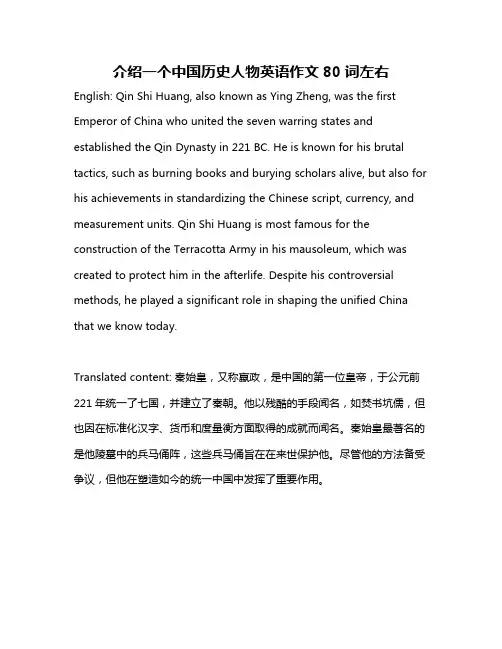
介绍一个中国历史人物英语作文80词左右English: Qin Shi Huang, also known as Ying Zheng, was the first Emperor of China who united the seven warring states and established the Qin Dynasty in 221 BC. He is known for his brutal tactics, such as burning books and burying scholars alive, but also for his achievements in standardizing the Chinese script, currency, and measurement units. Qin Shi Huang is most famous for the construction of the Terracotta Army in his mausoleum, which was created to protect him in the afterlife. Despite his controversial methods, he played a significant role in shaping the unified China that we know today.Translated content: 秦始皇,又称嬴政,是中国的第一位皇帝,于公元前221年统一了七国,并建立了秦朝。
他以残酷的手段闻名,如焚书坑儒,但也因在标准化汉字、货币和度量衡方面取得的成就而闻名。
秦始皇最著名的是他陵墓中的兵马俑阵,这些兵马俑旨在在来世保护他。
尽管他的方法备受争议,但他在塑造如今的统一中国中发挥了重要作用。
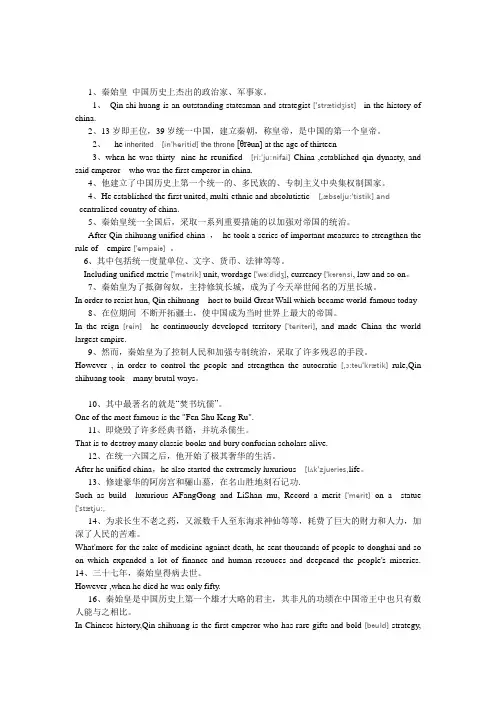
1、秦始皇中国历史上杰出的政治家、军事家。
1、Qin shi huang is an outstanding statesman and strategist ['strætidʒist] in the history of china.2、13岁即王位,39岁统一中国,建立秦朝,称皇帝,是中国的第一个皇帝。
2、he inherited [in'heritid] the throne [θrəun] at the age of thirteen3、when he was thirty- nine he reunified [ri:'ju:nifai]China ,established qin dynasty, and said emperor who was the first emperor in china.4、他建立了中国历史上第一个统一的、多民族的、专制主义中央集权制国家。
4、He established the first united, multi-ethnic and absolutistic [,æbsəlju:'tistik] and centralized country of china.5、秦始皇统一全国后,采取一系列重要措施的以加强对帝国的统治。
After Qin shihuang unified china ,he took a series of important measures to strengthen the rule of empire ['empaiə]。
6、其中包括统一度量单位、文字、货币、法律等等。
Including unified metric ['metrik] unit, wordage ['wə:didʒ], currency ['kərənsi, law and so on。
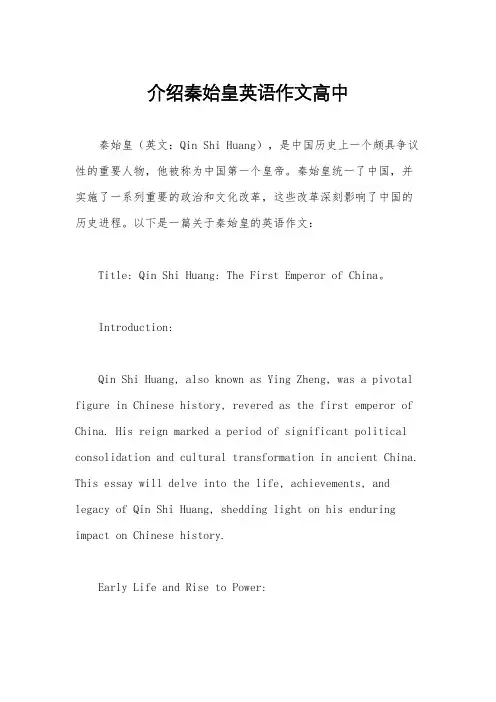
介绍秦始皇英语作文高中秦始皇(英文:Qin Shi Huang),是中国历史上一个颇具争议性的重要人物,他被称为中国第一个皇帝。
秦始皇统一了中国,并实施了一系列重要的政治和文化改革,这些改革深刻影响了中国的历史进程。
以下是一篇关于秦始皇的英语作文:Title: Qin Shi Huang: The First Emperor of China。
Introduction:Qin Shi Huang, also known as Ying Zheng, was a pivotal figure in Chinese history, revered as the first emperor of China. His reign marked a period of significant political consolidation and cultural transformation in ancient China. This essay will delve into the life, achievements, and legacy of Qin Shi Huang, shedding light on his enduring impact on Chinese history.Early Life and Rise to Power:Born in 259 BCE in the state of Qin, Ying Zheng ascended to the throne at the tender age of 13 following the death of his father, King Zhuangxiang. Despite his youth, Ying Zheng displayed remarkable leadership qualities and quickly asserted his authority over the state of Qin. With the assistance of his prime minister, Li Si, he embarked on an ambitious mission to unify China under the Qin dynasty.Unification of China:Qin Shi Huang's most enduring legacy lies in his successful unification of the warring states that comprised ancient China. Through a combination of military conquests and shrewd political maneuvering, he brought an end to centuries of conflict and established a centralizedimperial government. This feat was achieved in 221 BCE when Qin conquered the last rival state, Qi, thereby realizing his vision of a unified China.Political Reforms:As the first emperor of a unified China, Qin Shi Huang implemented a series of far-reaching political reformsaimed at consolidating his power and centralizing authority. One of his most significant achievements was the standardization of laws, weights, measures, and the Chinese script. This uniformity facilitated governance and communication across the vast expanse of the empire, laying the groundwork for its long-term stability.Construction Projects:Qin Shi Huang is perhaps best known for his ambitious construction projects, most notably the Great Wall of China and the mausoleum containing the Terracotta Army. The Great Wall, originally conceived as a defensive barrier against northern invaders, remains one of the most iconic symbolsof Chinese civilization. Similarly, the Terracotta Army, constructed to accompany Qin Shi Huang into the afterlife, stands as a testament to the emperor's grandeur and the technological prowess of ancient China.Legacy and Controversies:While Qin Shi Huang's reign brought about unprecedented political unity and cultural standardization, it was also marked by authoritarianism and harsh governance. His draconian policies, including book burning and the suppression of dissent, have earned him a reputation as a tyrant in some historical accounts. Nevertheless, hislegacy as the first emperor of China endures, serving as a symbol of both the nation's greatness and the complexitiesof its imperial past.Conclusion:In conclusion, Qin Shi Huang's contributions to Chinese history are manifold and enduring. As the first emperor ofa unified China, he left an indelible mark on the political, cultural, and architectural landscape of the ancient world. While his legacy is not without controversy, his achievements continue to shape the course of Chinese civilization to this day, making him a figure of both admiration and debate in the annals of history.。
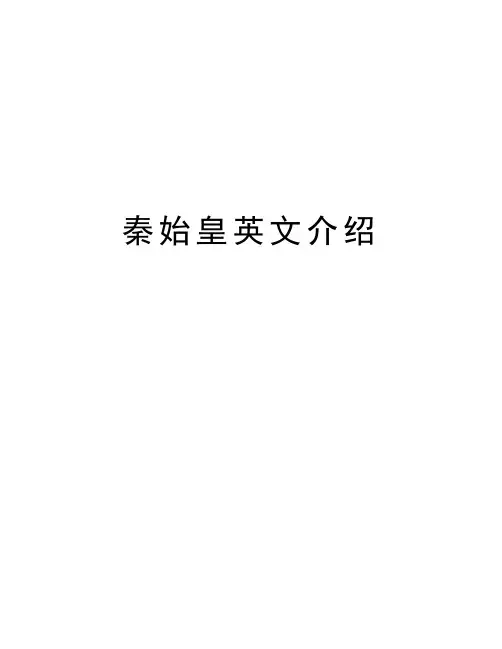
秦始皇英文介绍1、秦始皇中国历史上杰出的政治家、军事家。
1、 Qin shi huang is an outstanding statesman and strategist ['strætidʒist] in thehistory of china.2、13岁即王位,39岁统一中国,建立秦朝,称皇帝,是中国的第一个皇帝。
2、 he inherited [in'heritid] the throne [θrəun] at the age of thirteen3、when he was thirty- nine he reunified [ri:'ju:nifai] China ,established qin dynasty, and said emperor who was the first emperor in china.4、他建立了中国历史上第一个统一的、多民族的、专制主义中央集权制国家。
4、He established the first united, multi-ethnic and absolutistic [,æbsəlju:'tistik] andcentralized country of china.5、秦始皇统一全国后,采取一系列重要措施的以加强对帝国的统治。
After Qin shihuang unified china , he took a series of important measures to strengthen the rule of empire ['empaiə]。
6、其中包括统一度量单位、文字、货币、法律等等。
Including unified metric['metrik] unit, wordage ['wə:didʒ], currency ['kərənsi, law and soon。
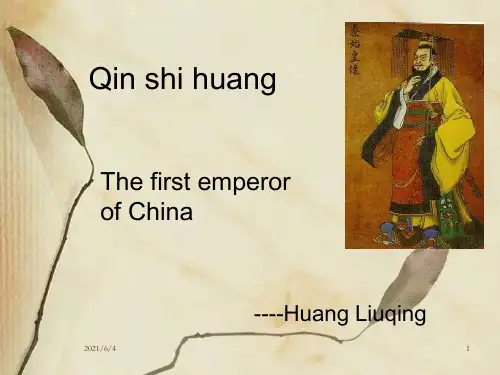
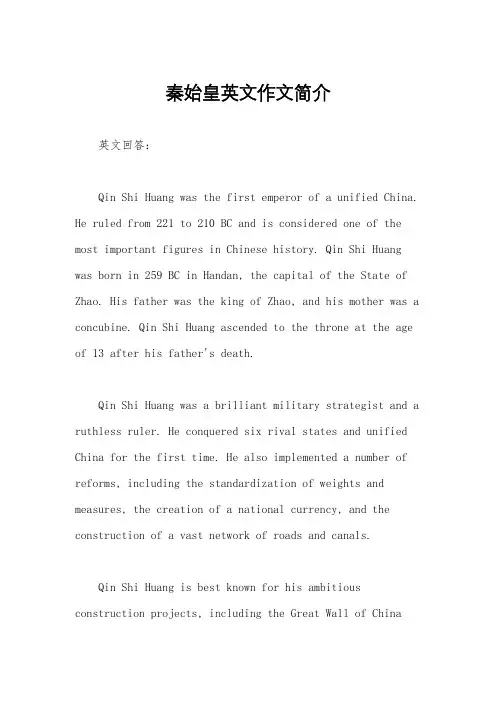
秦始皇英文作文简介英文回答:Qin Shi Huang was the first emperor of a unified China. He ruled from 221 to 210 BC and is considered one of the most important figures in Chinese history. Qin Shi Huang was born in 259 BC in Handan, the capital of the State of Zhao. His father was the king of Zhao, and his mother was a concubine. Qin Shi Huang ascended to the throne at the age of 13 after his father's death.Qin Shi Huang was a brilliant military strategist and a ruthless ruler. He conquered six rival states and unified China for the first time. He also implemented a number of reforms, including the standardization of weights and measures, the creation of a national currency, and the construction of a vast network of roads and canals.Qin Shi Huang is best known for his ambitious construction projects, including the Great Wall of Chinaand the terracotta army. The Great Wall was built to protect China from invaders from the north, and the terracotta army was buried with Qin Shi Huang to protect him in the afterlife.Qin Shi Huang was a controversial figure. He was a brilliant ruler who unified China and implemented a number of important reforms. However, he was also a ruthless tyrant who was responsible for the deaths of millions of people.中文回答:秦始皇,嬴姓赵氏,名政,中国历史上第一个大一统王朝——秦朝的开国皇帝。
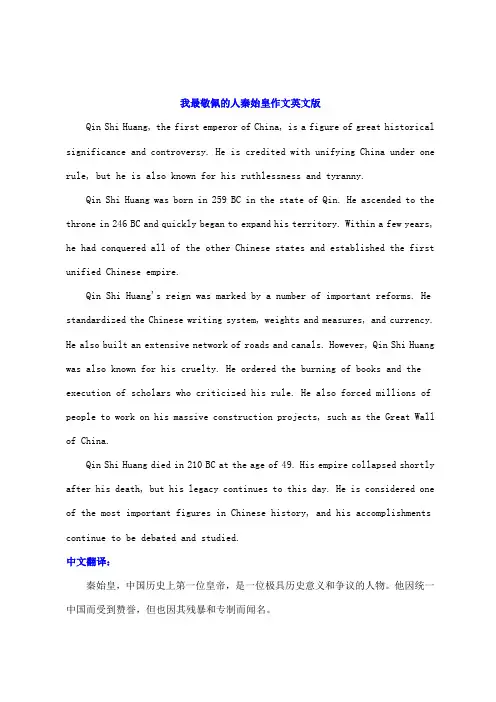
我最敬佩的人秦始皇作文英文版Qin Shi Huang, the first emperor of China, is a figure of great historical significance and controversy. He is credited with unifying China under one rule, but he is also known for his ruthlessness and tyranny.Qin Shi Huang was born in 259 BC in the state of Qin. He ascended to the throne in 246 BC and quickly began to expand his territory. Within a few years, he had conquered all of the other Chinese states and established the first unified Chinese empire.Qin Shi Huang's reign was marked by a number of important reforms. He standardized the Chinese writing system, weights and measures, and currency. He also built an extensive network of roads and canals. However, Qin Shi Huang was also known for his cruelty. He ordered the burning of books and the execution of scholars who criticized his rule. He also forced millions of people to work on his massive construction projects, such as the Great Wall of China.Qin Shi Huang died in 210 BC at the age of 49. His empire collapsed shortly after his death, but his legacy continues to this day. He is considered one of the most important figures in Chinese history, and his accomplishments continue to be debated and studied.中文翻译:秦始皇,中国历史上第一位皇帝,是一位极具历史意义和争议的人物。
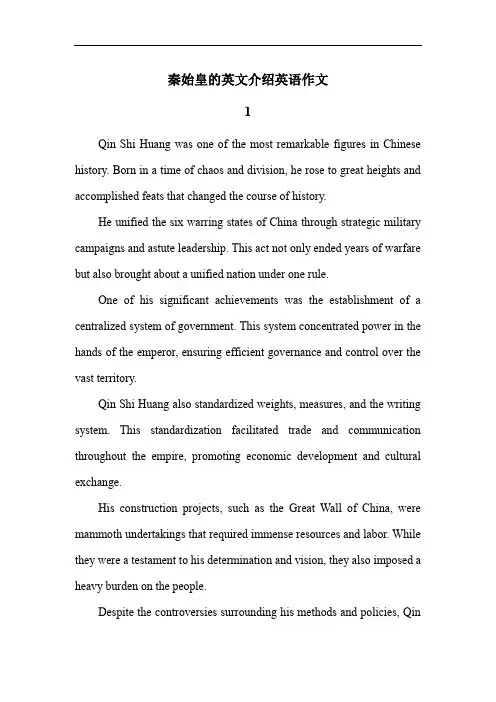
秦始皇的英文介绍英语作文1Qin Shi Huang was one of the most remarkable figures in Chinese history. Born in a time of chaos and division, he rose to great heights and accomplished feats that changed the course of history.He unified the six warring states of China through strategic military campaigns and astute leadership. This act not only ended years of warfare but also brought about a unified nation under one rule.One of his significant achievements was the establishment of a centralized system of government. This system concentrated power in the hands of the emperor, ensuring efficient governance and control over the vast territory.Qin Shi Huang also standardized weights, measures, and the writing system. This standardization facilitated trade and communication throughout the empire, promoting economic development and cultural exchange.His construction projects, such as the Great Wall of China, were mammoth undertakings that required immense resources and labor. While they were a testament to his determination and vision, they also imposed a heavy burden on the people.Despite the controversies surrounding his methods and policies, QinShi Huang's impact on China's history cannot be underestimated. His actions laid the foundation for the subsequent development and stability of the nation, leaving an indelible mark that still resonates to this day.2Qin Shi Huang was one of the most influential figures in Chinese history. His reign was marked by bold and far-reaching strategies that had a profound and lasting impact on the subsequent development of China.He implemented a Legalist approach to governance, emphasizing strict laws and centralized authority. This philosophy laid the foundation for the establishment and consolidation of a unified and efficient administrative system in ancient China. Under his rule, the state's power was concentrated, and the bureaucracy became more organized and disciplined.One of the most remarkable achievements of Qin Shi Huang was the construction of the Great Wall. This colossal project was not only a physical barrier against foreign invaders but also a symbol of the might and determination of his empire. The construction of the Great Wall required immense resources and manpower, demonstrating his ability to mobilize the nation for a grand objective.His policies also included standardization of weights, measures, and the writing system. This uniformity facilitated communication and trade across the vast territory, promoting economic integration and culturalexchange.However, his rule was not without controversy. The strictness of his laws and the demands placed on the people led to some hardships and dissatisfaction.In conclusion, Qin Shi Huang's reign was a complex and significant period. His strategies and actions, both positive and negative, have shaped China's history and continue to be subjects of study and reflection.3Qin Shi Huang was one of the most remarkable figures in Chinese history. He was a man of great determination and ambition. His bold decisions and unwavering resolve led to significant achievements that changed the course of history.Qin Shi Huang was known for his fearless nature. He was not afraid to take risks and make tough choices in order to achieve his goals. His ambition knew no bounds as he set out to unite the various warring states and create a unified empire. This was no easy task, but his strategic mind and strong leadership enabled him to overcome countless obstacles.He was a master at manipulating and controlling his ministers. He knew how to utilize their talents and skills to the fullest, while also keeping them in check to ensure their loyalty. His ability to balance power and make shrewd political decisions was a key factor in his success.Under his rule, significant reforms were implemented. Thestandardization of weights, measures, and the writing system brought order and unity to the empire. The construction of the Great Wall was a testament to his vision and determination to protect his realm.In conclusion, Qin Shi Huang's unique combination of personal traits and leadership skills earned him a special place in history. His legacies continue to fascinate and inspire us to this day.4Qin Shi Huang was one of the most influential figures in Chinese history. His achievements and mistakes have been the subjects of much discussion and debate.On the one hand, Qin Shi Huang's greatest accomplishment was unifying the warring states and establishing a centralized empire. This brought an end to years of chaos and warfare, allowing for a unified system of laws, currency, and measurements. It laid the foundation for the subsequent development and stability of China. His construction of the Great Wall was a remarkable feat that provided protection against invaders and became a symbol of China's ancient civilization.However, on the other hand, Qin Shi Huang's actions also had negative consequences. The policy of burning books and burying Confucian scholars was a severe blow to culture and knowledge. It destroyed a large amount of precious literature and restricted the development of thought and education. Additionally, his heavy taxationand conscription policies placed a heavy burden on the people, leading to widespread hardship and dissatisfaction.In conclusion, Qin Shi Huang's reign was a complex mixture of great achievements and serious mistakes. We should objectively evaluate his historical role, drawing lessons from both his successes and failures to better understand and shape the present and future.5The First Emperor of Qin, Ying Zheng, was a remarkable figure in Chinese history. Born into a time of great chaos and constant warfare during the Warring States Period, he emerged as a powerful leader with an unwavering determination to unite the fragmented states.The turmoil and fierce competition among the various states pushed Ying Zheng to adopt resolute and forceful measures. The endless battles had brought immense suffering to the people, and he saw unity as the only way to bring stability and prosperity. He employed brilliant strategies and gathered a group of talented advisers to assist him in his quest for dominance.His decision to implement strict laws and centralize power was not merely an act of tyranny but a strategic choice to maintain control over a vast and newly unified empire. The standardization of weights, measures, and the written language were bold steps aimed at facilitating efficient governance and promoting cultural integration.However, his excessive pursuit of grand projects such as the construction of the Great Wall and the Terracotta Army placed a heavy burden on the common people. This, combined with his harsh policies, led to discontent among the masses.In conclusion, the reign of the First Emperor of Qin was a complex mixture of remarkable achievements and controversial decisions. His actions were deeply rooted in the historical context of his time, and his influence on Chinese history remains profound and far-reaching.。
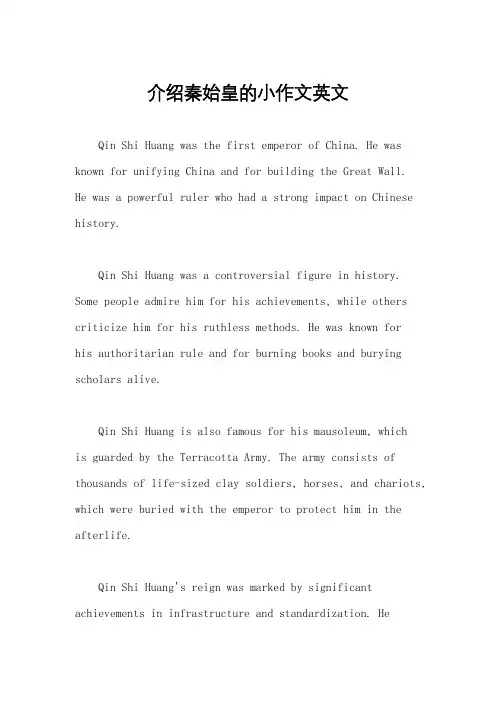
介绍秦始皇的小作文英文Qin Shi Huang was the first emperor of China. He was known for unifying China and for building the Great Wall.He was a powerful ruler who had a strong impact on Chinese history.Qin Shi Huang was a controversial figure in history. Some people admire him for his achievements, while others criticize him for his ruthless methods. He was known forhis authoritarian rule and for burning books and burying scholars alive.Qin Shi Huang is also famous for his mausoleum, whichis guarded by the Terracotta Army. The army consists of thousands of life-sized clay soldiers, horses, and chariots, which were buried with the emperor to protect him in the afterlife.Qin Shi Huang's reign was marked by significant achievements in infrastructure and standardization. Heimplemented a standardized system of writing, currency, and measurements, which helped to unify the country and improve communication and trade.Qin Shi Huang died at a relatively young age, and his death led to the downfall of the Qin Dynasty. Despite his controversial legacy, he is remembered as a pivotal figure in Chinese history.。
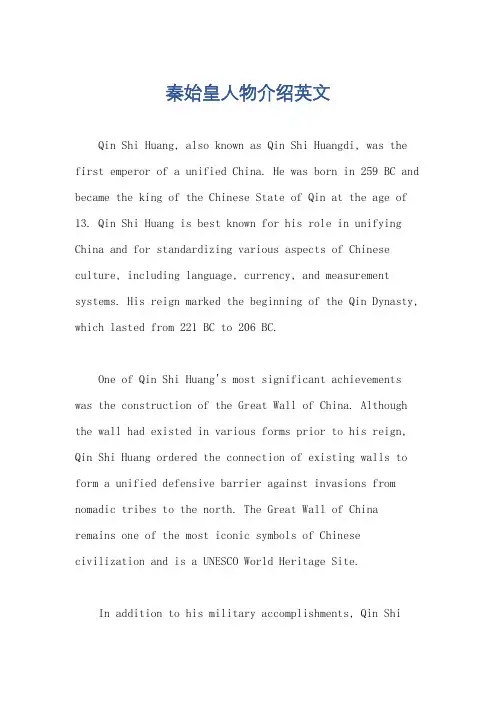
秦始皇人物介绍英文Qin Shi Huang, also known as Qin Shi Huangdi, was the first emperor of a unified China. He was born in 259 BC and became the king of the Chinese State of Qin at the age of 13. Qin Shi Huang is best known for his role in unifying China and for standardizing various aspects of Chinese culture, including language, currency, and measurement systems. His reign marked the beginning of the Qin Dynasty, which lasted from 221 BC to 206 BC.One of Qin Shi Huang's most significant achievements was the construction of the Great Wall of China. Although the wall had existed in various forms prior to his reign, Qin Shi Huang ordered the connection of existing walls to form a unified defensive barrier against invasions from nomadic tribes to the north. The Great Wall of China remains one of the most iconic symbols of Chinese civilization and is a UNESCO World Heritage Site.In addition to his military accomplishments, Qin ShiHuang is also remembered for his ruthless tactics and authoritarian rule. He implemented strict legal codes and harsh punishments for those who opposed him, earning a reputation for cruelty and tyranny. Despite these negative aspects of his rule, Qin Shi Huang's centralized government and administrative reforms laid the foundation for the future development of China as a unified nation.Qin Shi Huang is perhaps most famous for his obsession with immortality. He embarked on a quest for the elixir of life, seeking eternal youth and power. He ordered the construction of the Terracotta Army, a vast collection of life-sized clay soldiers and horses buried near his tomb, in the belief that they would protect him in the afterlife. The discovery of the Terracotta Army in 1974 has provided valuable insights into the military and artistic achievements of the Qin Dynasty.Despite his efforts to achieve immortality, Qin Shi Huang died in 210 BC at the age of 49. His death led to a power struggle among his successors, ultimately resulting in the collapse of the Qin Dynasty. However, Qin ShiHuang's legacy endured, shaping the course of Chinese history for centuries to come. Today, he is remembered as a complex figure who left a lasting impact on China's political, cultural, and architectural landscape.。
介绍秦始皇的小作文英文英文:As the first emperor of China, Qin Shi Huang was a controversial and influential figure in Chinese history. He was known for his ruthless and authoritarian rule, as well as his ambitious and grandiose projects.Qin Shi Huang is best known for his role in unifying China and establishing the Qin Dynasty. He was a visionary leader who sought to centralize power and create a strong, centralized state. One of his most significant achievements was the construction of the Great Wall of China, which was built to protect the newly unified empire from external threats.In addition to his military and political accomplishments, Qin Shi Huang is also remembered for his cultural and intellectual contributions. He standardized the Chinese script, currency, and measurements, whichhelped to unify the diverse regions of the empire. He also ordered the infamous burning of books and burying of scholars in an attempt to suppress dissent and promote his own ideology.Despite his accomplishments, Qin Shi Huang's reign was marked by tyranny and cruelty. He was known for his harsh treatment of his subjects and his ruthless suppression of dissent. His quest for immortality led him to search for the elixir of life, and he died during one of his expeditions in search of it.Overall, Qin Shi Huang's legacy is complex and multifaceted. While he is remembered for his unification of China and his ambitious projects, he is also criticized for his authoritarian rule and brutal methods of governance.中文:秦始皇作为中国的第一位皇帝,在中国历史上是一个具有争议性和影响深远的人物。
讲述秦始皇故事英文作文English:In ancient China, there was a remarkable emperor known as Qin Shi Huang. His story is one of ambition, power, and legacy that continues to captivate us to this day.Qin Shi Huang was born as Ying Zheng in 259 BC. He ascended to the throne of the Qin state at just thirteen years old after the death of his father. Despite his young age, he displayed extraordinary leadership qualities and a fierce determination to unify China under his rule.One of the most famous aspects of Qin Shi Huang's reign was the construction of the Great Wall of China. This colossal project aimed to protect the northern borders of the empire from invasions by nomadic tribes. The wall stretched over thousands of miles, a testament to the sheer magnitude of Qin Shi Huang's vision and ambition.Another iconic achievement of Qin Shi Huang was the standardization of various aspects of Chinese culture, including currency, weights and measures, and the written script. This standardization played a crucial role in unifying the diverse regions of China under a single centralized government.However, Qin Shi Huang's legacy is also tainted by controversy. He was known for his authoritarian rule and ruthless methods of governance. He implemented harsh legalistic policies and ordered the burning of books and the burial of scholars in an attempt to suppress dissent and maintain control over his empire.Despite his achievements, Qin Shi Huang's quest for immortality ultimately led to his downfall. He became obsessed with finding the elixir of life and spent vast resources on extravagant projects in pursuit of eternal youth. Unfortunately, his obsession only hastened his demise, as he died in 210 BC during one of his journeys to seek immortality.Qin Shi Huang's story serves as a cautionary tale about the dangers of unchecked ambition and the fleeting nature of power. His legacy is a complex one, marked by both remarkable achievements and controversial actions, but his impact on Chinese history is undeniable.中文:在古代中国,有一位著名的皇帝,他就是秦始皇。
英文作文(初中水平):The Great Emperor Qin Shi HuangThe Great Emperor Qin Shi Huang is one of the most influential figures in Chinese history. He was the first emperor to unify China under the Qin Dynasty. His contributions to Chinese civilization are immense and diverse.First and foremost, Qin Shi Huang unified China by conquering all the warring states. This brought peace and stability to the land, allowing people to focus on developing their economy and culture. He also standardized the writing system, currency, and measures, which greatly facilitated trade and communication.Moreover, Qin Shi Huang was a great builder. He constructed the famous Terracotta Warriors to guard his tomb, which are now a world-renowned tourist attraction. Additionally, he built roads and canals that connected different parts of the country, improving transportation and trade.However, Qin Shi Huang's reign was also marked by cruelty and oppression. He imposed harsh punishments for minor offenses and taxed the people heavily. His obsession with immortality and the search for the elixir of life also consumed a great deal of resources.In conclusion, Qin Shi Huang was a complex figure who left a profound impact on Chinese history. His achievements in unifying China and promoting cultural standardization are remarkable, but his cruelty and oppressive policies also cannot be ignored.中文翻译:秦始皇是中国历史上最有影响力的人物之一。
描写秦始皇英文作文英文:As the first emperor of China, Qin Shi Huang was a remarkable figure in Chinese history. He is known for unifying the warring states and establishing the Qin dynasty, as well as for his strict legalist policies and his massive construction projects, such as the Great Wall and the Terracotta Army.Qin Shi Huang was a strong and decisive leader, but he was also ruthless and paranoid. He ordered the burning of books and the burying of scholars in order to eliminate dissenting voices, and he was obsessed with finding the elixir of life and achieving immortality.Despite his flaws, Qin Shi Huang's legacy is still felt in China today. His unification of the country laid the foundation for the long-lasting Chinese empire, and his construction projects continue to be marvels of engineeringand art.中文:秦始皇作为中国的第一位皇帝,在中国历史上是一个杰出的人物。
我最喜欢的历史人物秦始皇作文英文My Favorite Historical Figure: Qin Shi HuangQin Shi Huang, the first emperor of China, is one of the most famous and influential figures in Chinese history. He unified China for the first time in 221 BC and established the Qin Dynasty, which lasted for only 15 years but had a profound impact on Chinese history.Qin Shi Huang was born in 259 BC in the state of Qin. He was the son of King Zhuangxiang of Qin and Queen Zhao. When he was 13 years old, he succeeded his father as the king of Qin. Under the guidance of his advisers, such as Li Si and Wei Liao, he began to implement a series of reforms and military campaigns to strengthen the state of Qin and expand its territory.In 230 BC, Qin Shi Huang launched a series of campaigns against the six other states of China, namely Han, Zhao, Wei, Chu, Yan, and Qi. Through these campaigns, he was able to unify China for the first time in history and establish the Qin Dynasty. After the unification, he implemented a series of reforms to strengthen the central government and standardize the laws, currency, weights and measures, and writing system throughout the country.One of the most important reforms implemented by Qin Shi Huang was the abolition of the feudal system and the establishment of a centralized bureaucracy. Under the feudal system, the country was divided into many small states, each ruled by a noble. This system led to frequent wars and instability. Qin Shi Huang abolished the feudal system and established a centralized bureaucracy, in which the emperor was the supreme ruler and the government officials were appointed by the emperor. This system helped to strengthen the central government and maintain the stability of the country.Another important reform implemented by Qin Shi Huang was the standardization of the laws, currency, weights and measures, and writing system throughout the country. Before the unification, each state had its own laws, currency, weights and measures, and writing system, which made it difficult for people to communicate and trade with each other. Qin Shi Huang standardized these systems throughout the country, which helped to promote economic development and cultural exchange.In addition to these reforms, Qin Shi Huang also ordered the construction of many large-scale projects, such as the Great Wall of China, the Lingqu Canal, and the Terracotta Army. The Great Wall of China, which was built to defend the northern border of China against the invasion of the Xiongnu, is one of the most famous and impressive structures in the world. The Lingqu Canal, which was built to connect the Yangtze River and the Pearl River, is one of the oldest and longest canals in the world. The Terracotta Army, which was buried with Qin Shi Huang after his death, is a collection of thousands of life-sized terracotta figures of soldiers, horses, and chariots, which is considered one of the greatest archaeological discoveries of the 20th century.Qin Shi Huang’s reign was not without controversy. He was known for his strict laws and harsh punishments, which led to widespread dissatisfaction among the people. He also ordered the burning of many books and the burying of many scholars alive, which is known as the “Burning of the Books and Burying of the Scholars.” These actions were seen as an attempt to suppress intellectual freedom and cultural diversity.Despite these controversies, Qin Shi Huang is still regarded as one of the most important and influential figures in Chinese history. His unification of China and the implementation of a series of reforms had a profound impact on Chinese history and laid the foundation for the development of Chinese civilization. His construction of many large-scale projects also left a lasting legacy for future generations.Qin Shi Huang is my favorite historical figure because of his achievements and contributions to Chinese history. His unification of China and the implementation of a series of reforms had a profoundimpact on Chinese history and laid the foundation for the development of Chinese civilization. His construction of many large-scale projects also left a lasting legacy for future generations. Although his reign was not without controversy, his achievements and contributions cannot be ignored.。
描写秦始皇的英语作文简单Emperor Qin Shi Huang, the first emperor of China, is a legendary figure in Chinese history. He is known for his great achievements in unifying China and building the Great Wall. However, his reign was also marked by controversy and brutality.Qin Shi Huang was born in 259 BC in the state of Qin.He became the king of Qin at the age of 13, and went on to conquer the other six states and unify China in 221 BC. He declared himself the first emperor of China and began a series of reforms aimed at centralizing power and standardizing language, currency, weights and measures, and laws.One of Qin Shi Huang's most famous achievements is the construction of the Great Wall of China. He ordered thewalls of various states to be connected into a single wallto protect China from invaders. The construction of thewall involved the labor of hundreds of thousands of workers,many of whom died from harsh conditions and forced labor.Qin Shi Huang also ordered the construction of his mausoleum, which is famous for its terracotta warriors. The mausoleum was built over a period of 38 years and is said to contain treasures and artifacts beyond imagination.However, Qin Shi Huang's reign was also marked by controversy and brutality. He was known for his harsh punishments and strict laws, such as the punishment of "burying alive" for those who opposed him. He also ordered the burning of books and the burying of scholars who disagreed with his ideas.Despite his controversial legacy, Qin Shi Huang's achievements in unifying China and building the Great Wall have left a lasting impact on Chinese history. His legacy continues to be studied and debated by scholars and historians to this day.。
1、秦始皇中国历史上杰出的政治家、军事家。
1、Qin shi huang is an outstanding statesman and strategist ['strætidʒist] in the history of china.
2、13岁即王位,39岁统一中国,建立秦朝,称皇帝,是中国的第一个皇帝。
2、he inherited [in'heritid] the throne [θrəun] at the age of thirteen
3、when he was thirty- nine he reunified [ri:'ju:nifai] China ,established qin dynasty, and said emperor who was the first emperor in china.
4、他建立了中国历史上第一个统一的、多民族的、专制主义中央集权制国家。
4、He established the first united, multi-ethnic and absolutistic [,æbsəlju:'tistik] and centralized country of china.
5、秦始皇统一全国后,采取一系列重要措施的以加强对帝国的统治。
After Qin shihuang unified china ,he took a series of important measures to strengthen the rule of empire ['empaiə]。
6、其中包括统一度量单位、文字、货币、法律等等。
Including unified metric ['metrik] unit, wordage ['wə:didʒ], currency ['kərənsi, law and so on。
7、秦始皇为了抵御匈奴,主持修筑长城,成为了今天举世闻名的万里长城。
In order to resist hun, Qin shihuang host to build Great Wall which became world-famous today
8、在位期间不断开拓疆土,使中国成为当时世界上最大的帝国。
In the reign [rein]he continuously developed territory ['teritəri], and made China the world largest empire.
9、然而,秦始皇为了控制人民和加强专制统治,采取了许多残忍的手段。
However , in order to control the people and strengthen the autocratic [,ɔ:təu'krætik]rule,Qin shihuang took many brutal ways。
10、其中最著名的就是“焚书坑儒”。
One of the most famous is the "Fen Shu Keng Ru".
11、即烧毁了许多经典书籍,并坑杀儒生。
That is to destroy many classic books and bury confucian scholars alive.
12、在统一六国之后,他开始了极其奢华的生活。
After he unified china,he also started the extremely luxurious [lʌk'zjuəriəs,life。
13、修建豪华的阿房宫和骊山墓,在名山胜地刻石记功.
Such as build luxurious AFangGong and LiShan mu, Record a merit ['merit]on a statue ['stætju:,
14、为求长生不老之药,又派数千人至东海求神仙等等,耗费了巨大的财力和人力,加深了人民的苦难。
What'more for the sake of medicine against death, he sent thousands of people to donghai and so on which expended a lot of finance and human resouces and deepened the people's miseries.
14、三十七年,秦始皇得病去世。
However ,when he died he was only fifty.
16、秦始皇是中国历史上第一个雄才大略的君主,其非凡的功绩在中国帝王中也只有数人能与之相比。
In Chinese history,Qin shihuang is the first emperor who has rare gifts and bold [bəuld] strategy,
only a few people can be compared with him in chinese emperors about his great achievements .
17、虽然他在晚年给人民带来了沉重的灾难,但他对中国历史所作的功绩远远大于他的过失。
Although he brought people heavy disaster in later life , his achievement for china is far more than his error.。